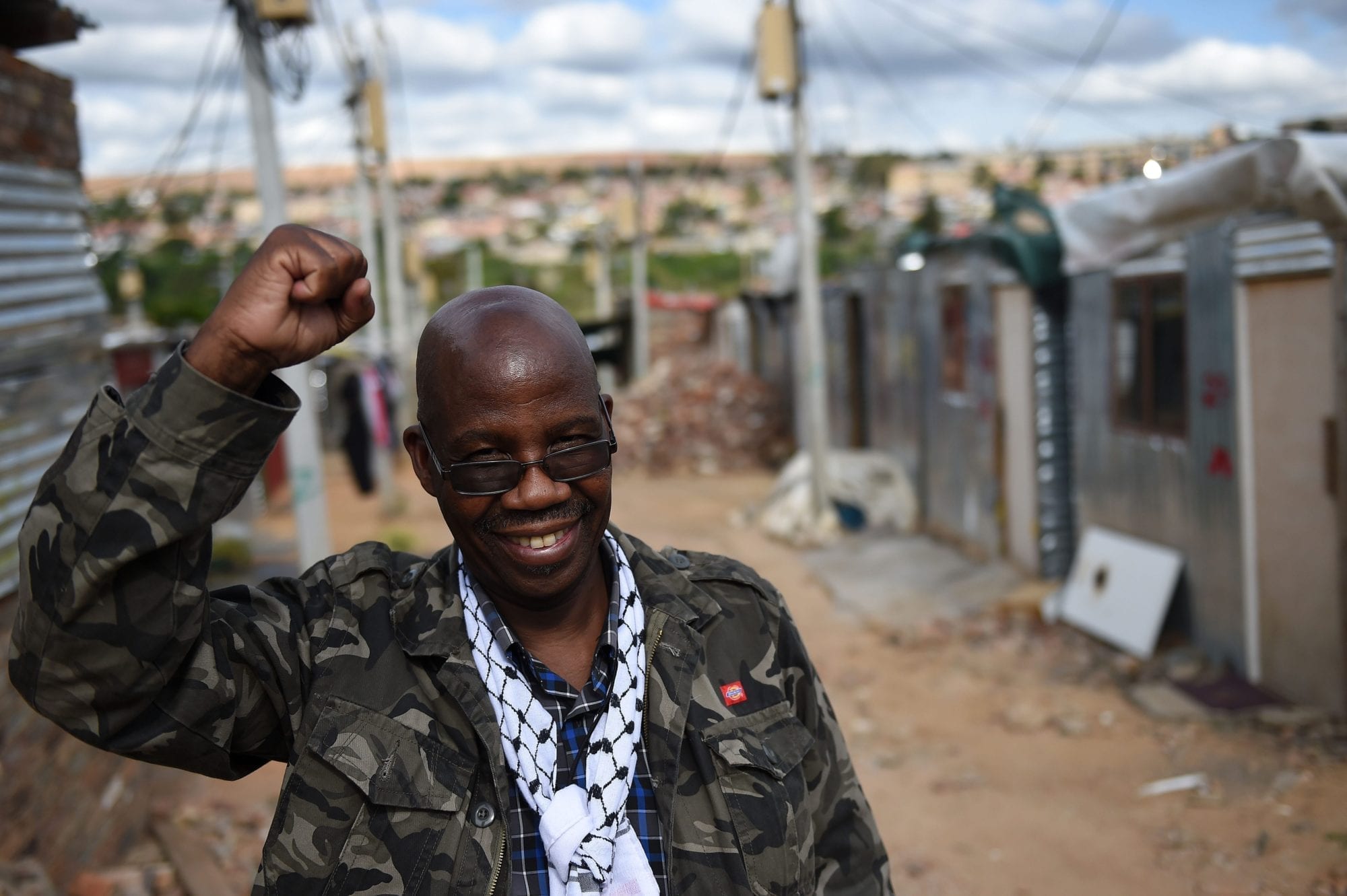
Oct 10, 2017
Freedom of peaceful assembly and association lie at the core of any functioning democratic system, according to a report by the new Annalisa Ciampi, the new United Nations (UN) Special Rapporteur on the rights to freedom of peaceful assembly and of association.
“It is the combination of the right to freedom of peaceful assembly and the right to freedom of association that strengthens responsive democratic governance systems and ensures the full and meaningful exercise of the right to participate in public affairs,” writes Ciampi in her first report to the UN General Assembly.

Annalisa Ciampi’s first report as UN Special Rapporteur finds that worker rights go hand in hand with democratic development. Credit: UN
Ciampi, whose three-year term as Special Rapporteur began May 1, is an attorney and a professor of International Law at the University of Verona in Italy, and a visiting professor of European Human Rights Law at the Monash University Prato Center in Italy.
Worker rights go hand in hand with democratic development, according to the report, with the Special Rapporteur emphasizing “the mutually reinforcing relationship between freedom of peaceful assembly and of association … and democracy and development.”
(Ciampi is moderating an October 17 panel, “Expanding Space within the United Nations,” an event co-sponsored by the Solidarity Center. The side event at the UN General Assembly meeting in New York City will bring together national representatives, UN bodies and civil society representatives to discuss strategies to more effectively promote and protect civic space in the UN system through the development of responsive and inclusive UN mechanisms and processes.)
Trade union rights are covered under the mandate of the UN Special Rapporteur and exist in numerous international standards, including the International Covenant on Civil and Political Rights. Unions have been working together with other civil society groups to highlight global restrictions on freedom of association and assembly.
In the new report, “Rights to Freedom of Peaceful Assembly and of Association,” Ciampi also outlines topics for upcoming reports, which include looking at how the rights to assembly and association are exercised in the context of multilateral institutions, and examining practices that promote and protect the right to form unions.
Ciampi plans to take an active role in strategic litigation cases before national, regional and international courts in cases relating to freedom of peaceful association and of assembly.
“As the Special Rapporteur previously reported, ‘workers face considerable opposition, harassment, stigmatization and even physical attacks’ in the exercise of these fundamental rights,” says Solidarity Center Legal Director Jeff Vogt.
“We welcome the commitment of Prof. Ciampi to use the legal authority of her office to intervene in support of workers’ rights in domestic litigation. Such interventions not only works to provide a remedy to workers, but also builds positive jurisprudence on the right to freedom of association.”
Previous UN Reports Examined Broad Range of Worker Rights Issues
Ciampi takes over from Maina Kiai, whose six-year term as Special Rapporteur saw a broad range of reports on the status of freedom of association in an era of global closing civic space. Among them, “The Rights to Freedom of Peaceful Assembly and of Association in the Workplace” found that without assembly and association rights, including the right to strike, workers have little leverage to change the conditions that entrench poverty, fuel inequality and limit democracy. Further, the report stated that discrimination, abuse and relegation to jobs at the bottom of the global economy undermine women workers’ ability to join and form organizations that defend their interests. Previous reports on freedom of association and assembly also looked at worker rights to form unions in countries such as South Korea, Chile and Kazakhstan, and examined issues that include the right to freedom of assembly and association in the context of elections and business.
A Special Rapporteur is an independent expert appointed by the UN Human Rights Council to examine and report back on a specific human rights theme or country situation. The mandate of the Special Rapporteur on freedom of peaceful assembly and of association includes studying trends, developments and challenges in relation to the exercise of these rights; making recommendations on ensuring their promotion and protection; and reporting on their violation, as well as on discrimination, threats or use of violence, harassment, persecution, intimidation or reprisals directed at those exercising these rights.
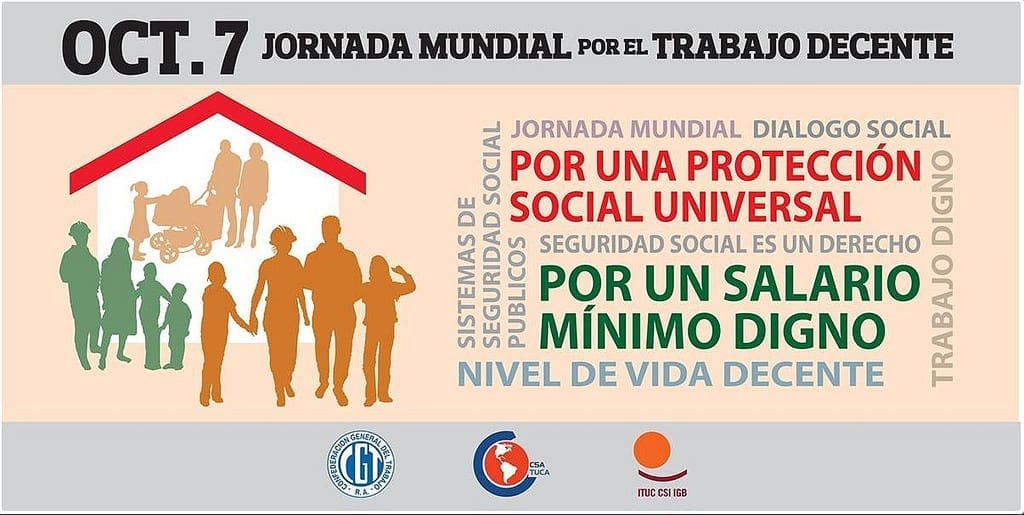
Oct 5, 2017
When Mwahamisi Josiah Makori, a Kenyan mother of three who worked as a domestic worker in Saudi Arabia, first arrived at her new employer’s house, she was given only 20 minutes before she began work. After that, she began a three-month period which involved hard labor, brutal sleeping conditions, and no pay. For three months, Makori cleaned two houses, took care of children, and was regularly beaten by her employers. Makori, who told her story to the Solidarity Center, now lives in Kenya after returning home after never receiving pay for her work.
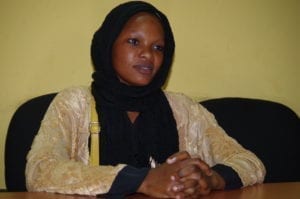
Mwahamisi Josiah Makori, a Kenyan mother of three, was abused by her Saudi employer, who never paid her for her work. Credit: Solidarity Center/Kate Conradt
The conditions Makori faced, and which millions of workers around the world endure, fall outside the realm of what is called “decent work.” While all jobs come with inherent value, decent work entails jobs that are safe, pay living wages, take care of workers, provide breaks, and empower women.
This Saturday marks the 10th anniversary of World Day for Decent Work, which this year is focused on living wages, and the importance of minimum wages in ensuring that all workers can afford a quality standard of living. Some 80 percent of people surveyed around the world say the minimum wage in their country is too low, according to the International Trade Union Congress (ITUC), which spearheads World Day for Decent Work.
Makori and millions of others are forced to migrate for work because the only jobs available are in the informal economy, where low and unsteady pay, unsafe working conditions and lack of sick leave or other benefits often mean they cannot support themselves or their families.
More than half of all workers in the world are part of the informal economy, the majority of whom are women. By enabling informal economy workers, migrant workers, women workers and others traditionally excluded from union membership to join together to bargain collectively and demand their rights under the law, the Solidarity Center works to empower workers to raise their voice for dignity on the job, justice in their communities and greater equality in the global economy. Together in unions and worker associations, workers have the power to create decent work for themselves and ensure the work they do comes with dignity and economic justice.
Solidarity Center Standing up for Decent Work around the World
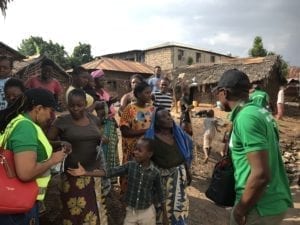
KUDHEIHA connects with community members in Mombasa during an education campaign on migrant worker rights. Credit: Solidarity Center/Deddeh Tulay
Recently in Kenya, the Kenya Union of Domestic, Hotel, Educational Institutions, Hospitals, and Allied Workers (KUDHEIHA), a Solidarity Center partner, made key progress in its struggle to strengthen the rights of workers who migrate from the country for work. Labor brokers often give workers false information about the wages and working conditions in other countries. A new proposal, crafted by Kenya’s Labor Ministry and KUDHEIHA, would require employers to provide workers with their contracts up front, so that there is no question of what workers should expect before they leave.
Elsewhere, Solidarity Center programs further advance rule of law and gender equality in unions and communities. In Iraq, for instance, union leader Sultan Mutlag Ahmed participated in a Solidarity Center labor law training and so was equipped to bring justice to construction workers by winning back their unpaid wages through a successful court case.
The Solidarity Center also is part of a global campaign to combat gender-based violence at work, one of the most tolerated abuses of workers’ rights. Together with the ITUC and global allies, the campaign seeks to build critical support for the adoption of an International Labor Organization convention on gender-based violence.
As unions around the world stand up for decent work October 7, you can support and follow the actions on Twitter with the hashtag #WDDW and #OurPayRise. Also check out the ITUC’s World Day for Decent Work to download logos and infographics.
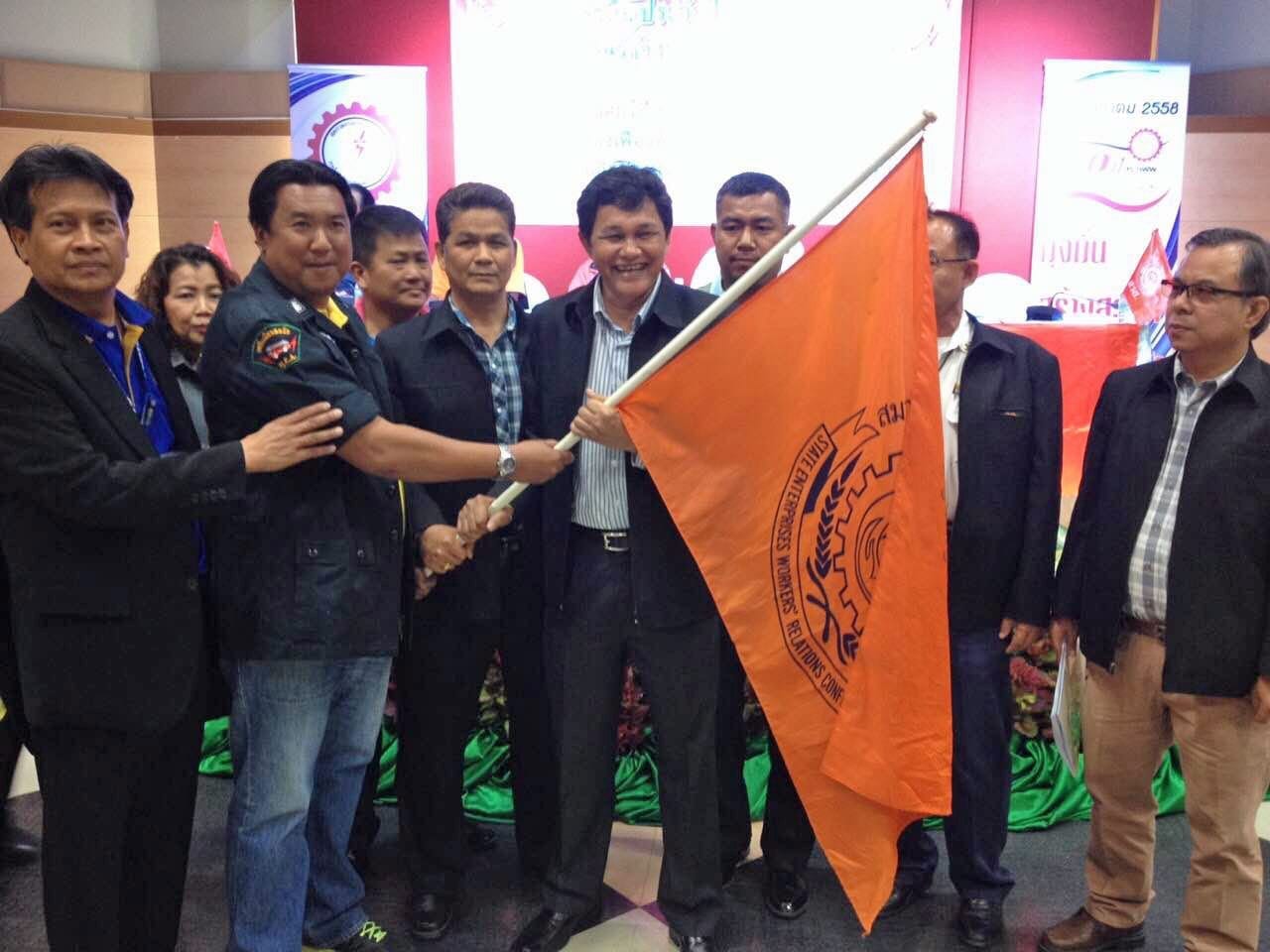
Oct 4, 2017
Public-sector employees in Thailand are stepping up their campaign to save jobs and hard-won benefits that would be lost if lawmakers approve a draft law privatizing state-owned companies.
Some 50,000 state enterprise workers will lose their jobs or transfer to companies with fewer benefits, and their collective bargaining process will also be at risk under the Public Holding Company Act, according to union leaders of the State Enterprises Workers’ Relations Confederation (SERC). SERC, a Solidarity Center ally and Thailand’s largest trade union organization, represents 180,000 members.
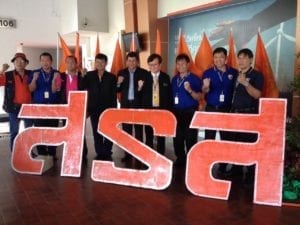
SERC leaders and members are challenging a proposed law that would deny public employees the right to form unions. Credit: Solidarity Center
The dynamic Thai union activist Sawit Kaewvarn last week was elected SERC general secretary by SERC’s Executive General Assembly and plans to take a strong stand to stop privatization of jobs. SERC also is concerned the draft bill may lead to exemption of several state enterprises under the State Enterprise Labor Relations Act (SELRA), effectively prohibiting workers’ legal rights to freedom of association and collective bargaining.
Last year after the bill was introduced, hundreds of SERC members gathered to petition the prime minister to express their disagreement with the bill, which they say could maximize profit-making at the expense of public services.
Kaewvarn also is president of Thai Labor Solidarity Committee (TLSC), which is campaigning for Thailand to ratify International Labor Organization (ILO) Convention 87 (freedom of association) and Convention 98 (right to organize and bargain collectively), and national labor law reform. Earlier this past summer, he mobilized TLSC members for a rally at the Ministry of Labor office in Bangkok to follow up on TLSC’s May Day demands, which include the ratification of the two conventions, a fair and living wage, implementation of occupational safety and health standards, effective allocation of safety and health funding, and enforcement of worker rights.
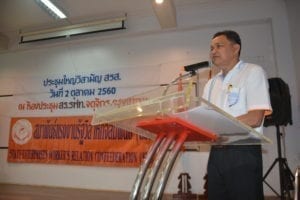
Sawit Kaewvarn was recently elected general secretary of SERC, a Solidarity Center ally and Thailand’s largest trade union organization. Credit: Solidarity Center
As TLSC president, Kaewvarn also is leading worker opposition to a Ministry of Labor proposal to expand the retirement benefit age from 55 to 60. Most workers in the private sector will be especially burdened, he says, because they must retire at age 55 and would struggle for five years before being entitled to the government-provided retirement benefit.
In June, Kaewvarn was elected general secretary of the State Railway Union of Thailand (SRUT). The election followed one last year in which the Ministry of Labor refused to register the results, which would have put Kaewvarn and his slate in office. Following a letter by the AFL-CIO to Thailand’s prime minister and Ministry of Labor urging the government to recognize the election results or order new elections, the government called for new elections in March and has now registered the results.
In 2009, Kaewvarn led Thai railway workers in a protest against unsafe working conditions, following a deadly train derailment. The State Railway of Thailand then dismissed several SRUT executive committee members, including Kaewvarn. Railway strikes are illegal in Thailand, a law the ILO says violates freedom of association. A National Human Rights Commission of Thailand found that the State Railway of Thailand violated freedom of association.

Sep 28, 2017
Kenyans going abroad to work as domestic workers will be required to have contracts, salaries and details of their work assignments before they leave, according to the (Kenya) Daily Nation.
The draft policy, crafted by the Labor Ministry and the Kenya Union of Domestic, Hotel, Educational Institutions, Hospitals and Allied Workers (KUDHEIHA), is part of KUDEIHA’s ongoing efforts to advance the rights of domestic workers in Kenya and abroad. (See a photo essay on KUDHEIHA outreach in Mvita.)
In Kenya and elsewhere, unscrupulous labor brokers often will not show migrating workers their contracts until they are at the airport or bus station, and frequently, the contracts are written in Arabic or a language the workers cannot understand. When they arrive at their destination, the contracts and promised salaries may even change.
“If approved, the policy takes a good first step in addressing the abuse and hardship many migrant domestic workers endure, problems exacerbated by their isolated work environments in employers’ homes,” says Hanad Mohamud, Solidarity Center Kenya country director. “But unless the policy is enforced, domestic workers, the majority of whom are women, will continue to be deceived about their wages, working conditions and terms of employment.”
In a recent series of Solidarity Center interviews, women who migrated from Mombasa to Saudi Arabia for jobs described their experiences, which included physical and verbal abuse, nonpayment of wages, inhumane sleeping conditions and 18-hour days with no days off.
Reaching out to Domestic Workers Migrating for Jobs
Over the summer, KUDHEIHA, a Solidarity Center partner, joined with allies in hosting a series of public informational forums throughout the Mombasa area on migrant worker rights. Local migrant worker and anti-human trafficking organizations, TRACE Kenya, Haki Africa and the Kenya National Commission on Human Rights helped support the events.
Although many workers in and around Mombasa travel abroad for jobs, primarily to Arab Gulf countries, customs or embarrassment may prevent them from sharing their experiences, and many residents do not have access to credible information on migration. As a result, communities are unaware of the hazards involved in migrating for work.
KUDHEIHA, which has long organized domestic workers throughout Kenya and has won national legislation improving domestic workers’ wages, benefits and working conditions, recently launched the campaign in Mombasa to reach domestic workers before they migrate and after they return.
KUDHEIHA also is pushing for enforcement of a law regulating labor agents, and working for laws that make it mandatory for informal economy employers to pay into the country’s social protection funds.
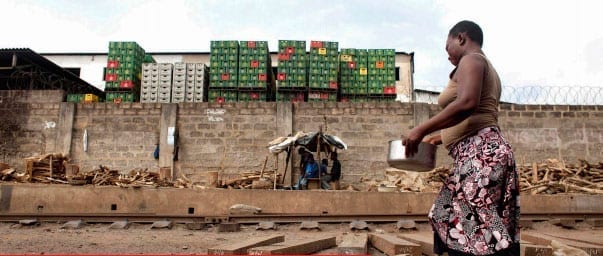
Sep 26, 2017
In the photo, a Ghanaian street vendor sells her wares in front of a massive multinational brewing company.
Guess who pays more in taxes?
The image, an ActionAid photo, shows the inequity of an impoverished vendor paying more in taxes than a major multinational, and makes concrete the reality of illicit financial flows for millions of Africans.
Africa loses at least $50 billion annually, likely much more, through illicit financial outflows, an amount equal to the development assistance it receives each year. Meanwhile, the number of people living on less than $1.25 a day is estimated to have increased from 290 million in 1990 to 414 million in 2010, according to a report commissioned by former South African President Thabo Mbeki. The report defines illicit financial flows as “money illegally earned, transferred or used.” The definition also encompasses the socially undesirable, such as the multinational corporate tax avoidance.
“The problem with IFFs in Africa is that money flows out of Africa and it never flows back,” says Luckystar Miyandazi, policy officer in the African Institutions Program at the European Center for Development Policy Management (ECDPM).
“When illicit financial flows happen, especially in Africa, there is a deficit of taxes,” she says. “Governments find ways of raising this money because they still need money to run, so that means increases in basic goods and services. [Higher] taxes on food, milk and so on affects workers, the community.”
Such regressive tax policies disproportionately harm informal workers and people living in poverty—the majority of whom are women.
Africa Delegation Travels US to Discuss Illegal Financial Flows
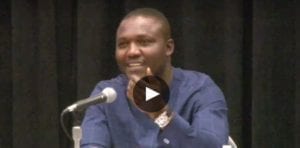
“The nature of investment we see that comes to Africa drives the race to the bottom”—Joel Odigie
Miyandazi is part of a four-person Solidarity Center delegation to the United States this month seeking to shine a light on the massive, yet little recognized crisis of illegal financial flows. The group spoke Monday at a panel on the University of California, Berkeley campus, and at a session sponsored by the Congressional Black Caucus Foundation’s Africa Braintrust in Washington, D.C., on Friday.
“The nature of investment we see that comes to Africa drives the race to the bottom,” says Joel Odigie, a member of the delegation and coordinator of Human and Trade Union Rights at the International Trade Union Confederation-Africa (ITUC-Africa). “There’s an attraction for financial direct investment, and business asks for benefits and concessions,” including lower labor standards, which drives down opportunities for good jobs. The result, says Odigie, is increasing numbers of working poor. (Odigie also spoke on the ITUC’s Radio Labor.)
“Work is on behalf of dignity—if you work, you get out of poverty,” he says. Yet “so many persons are working, breaking their backs, but they’re still in poverty.”
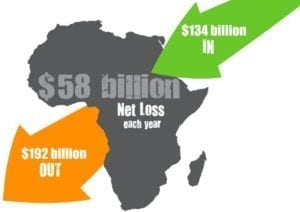 African trade unions and civil society organizations are leading this discussion and have responded with initiatives such as the launch of a transnational movement, Stop the Bleeding Africa, to educate around IFFs and mobilize citizens to advocate for corporate and government accountability.
African trade unions and civil society organizations are leading this discussion and have responded with initiatives such as the launch of a transnational movement, Stop the Bleeding Africa, to educate around IFFs and mobilize citizens to advocate for corporate and government accountability.
“For us the campaign around illicit financial flows is basically trying to make our members understand what the IFF is all about and bringing the message home—how this directly affects workers,” says Caroline Mugalla, executive secretary of the East Africa Trade Union Confederation (EATUC) and a delegation member. (Mugalla also spoke on the ITUC’s Radio Labor.)
Using Tanzania as an example, Mugalla says she points to the $4.8 billion Tanzania loses each year in illegal financial flows, and describes for people how that money could be used to improve the health delivery system and ensure children have access to education.
“Then people get it,” she says.
Going Forward
Mugalla says unions also are connecting with local government leaders to make the connection between the financial outflows and their struggle to provide basic services.
“A community has no water, no paved roads, no electricity—but the nearby mining company has it all,” she says.
When making tax policy, governments “need to take into account the people at the lowest level,” says Miyandazi. “For example, when a government gives a mining contract to a company and it’s going to displace people, governments should put people first and not multinationals.
The bottom line, says Miyandazi: “When making policy on Africa, Africa should be sitting at the table, part of the people who inform this policy and not be done by other people who think things should be done for Africa,” she says.
Gyekye Tanoh, team leader of the Policy Economy Unit at Third World Network Africa, also is taking part in the delegation.










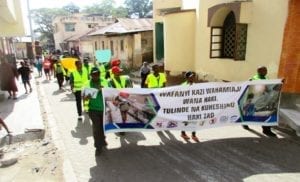


 African trade unions and civil society organizations are leading this discussion and have responded with initiatives such as the launch of a transnational movement,
African trade unions and civil society organizations are leading this discussion and have responded with initiatives such as the launch of a transnational movement,